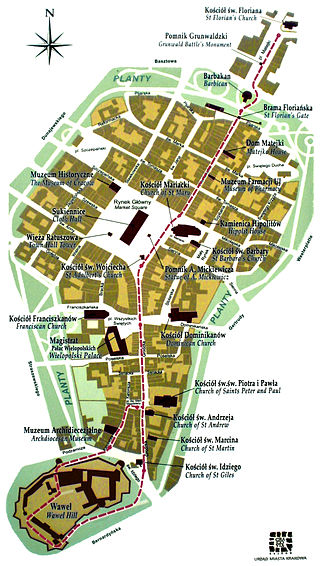Cracow or Kraków is a city in Poland.
Contents
Cracow may also refer to:
Cracow or Kraków is a city in Poland.
Cracow may also refer to:

Kraków, also seen spelled Cracow or absent Polish diacritics as Krakow, is the second-largest and one of the oldest cities in Poland. Situated on the Vistula River in Lesser Poland Voivodeship, the city dates back to the seventh century. Kraków was the official capital of Poland until 1596 and has traditionally been one of the leading centres of Polish academic, economic, cultural and artistic life. Cited as one of Europe's most beautiful cities, its Old Town with Wawel Royal Castle was declared a UNESCO World Heritage Site in 1978, one of the world's first sites granted the status.
Solaris may refer to:
NH or Nh may refer to
Tony may refer to:
Cue or CUE may refer to:
Free city may refer to:

The Free, Independent, and Strictly Neutral City of Cracow with its Territory, more commonly known as the Free City of Cracow, and the Republic of Cracow, was a city republic created by the Congress of Vienna in 1815, which included the Polish city of Cracow and its surrounding areas.
Def or DEF may refer to:
Cracovia is the Latin name for the Polish city of Kraków (Cracow). It may refer to:
Florian may refer to:

The Kraków Barbican is a barbican – a fortified outpost once connected to the city walls. It is a historic gateway leading into the Old Town of Kraków, Poland. The barbican is one of the few remaining relics of the complex network of fortifications and defensive barriers that once encircled the royal city of Kraków in the south of Poland. It currently serves as a tourist attraction and venue for a variety of exhibitions.
Kraków is a city in southern Poland.

Podgórze is a district of Kraków, Poland, situated on the right (southern) bank of the Vistula River, at the foot of Lasota Hill. The district was subdivided in 1990 into six new districts, see present-day districts of Kraków for more details. The name Podgórze roughly translates as the base of a hill. Initially a small settlement, in the years following the First Partition of Poland the town's development was promoted by the Austria-Hungary Emperor Joseph II who in 1784 granted it the city status, as the Royal Free City of Podgórze. In the following years it was a self-governing administrative unit. After the Third Partition of Poland in 1795 and the takeover of the entire city by the Empire, Podgórze lost its political role of an independent suburb across the river from the Old Town.
Krakowski is a Polish surname. It is a toponymic surname referring to the city of Kraków and environs. It appears in various forms in other languages.

The Grand Duchy of Kraków was created after the incorporation of the Free City of Cracow into Austria on November 16, 1846. From 1846 to 1918 the title, Grand Duke of Kraków, was part of the official titulary of the Emperor of Austria.
Cork or CORK may refer to:
Academy of Kraków (Cracow) or Kraków (Cracow) Academy most often refers to Jagiellonian University, the most famous of the universities of Kraków, Poland, and which held the official name of Akademia Krakowska from the Middle Ages until the Eighteenth century. However the term can be also applied to some more modern universities and academies in Kraków which use or used the name 'academy' in their title, particularly:
Krako or krakos, may refer to:

The Royal Road or Royal Route in Kraków, Poland, begins at the northern end of the medieval Old Town and continues south through the centre of town towards Wawel Hill, where the old royal residence, Wawel Castle, is located. The Royal Road passes some of the most prominent historic landmarks of Poland's royal capital, providing a suitable background to coronation processions and parades, kings' and princes' receptions, foreign envoys and guests of distinction traveling from a far country to their destination at Wawel.
John Paul II was the first Polish pope of the Roman Catholic church.